List of governors
Southwest Territory
The Territory South of the Ohio River, commonly known as the Southwest Territory, was organized on May 26, 1790. [3]
Throughout its 6-year history, Southwest Territory had only one governor appointed by the federal government, William Blount.
| Governor | Term in office [a] | Appointed by | |
|---|---|---|---|
 | William Blount (1749–1800) [4] | June 8, 1790 [b] – March 28, 1796 (statehood) | George Washington |
State of Tennessee
Southwest Territory was admitted to the Union as Tennessee on June 1, 1796. [7]
The first constitution of Tennessee, enacted in 1796, set a term of two years for the governor and provided that no person could serve as governor for more than 6 years in any 8-year period. [8] The term of office was lengthened to four years, without the possibility of consecutive terms, by constitutional amendments adopted in 1953. [9] Under the current provisions of the state constitution, as amended in 1978, the governor is elected to a four-year term and may serve no more than two terms consecutively. [9] [10]
| No. | Governor | Term in office | Party | Election | Lt. Governor [c] | |||
|---|---|---|---|---|---|---|---|---|
| 1 |  | John Sevier (1745–1815) [11] [12] | March 30, 1796 [13] – September 23, 1801 (term-limited) [d] | Democratic- Republican [15] | 1796 | Office did not exist | ||
| 1797 | ||||||||
| 1799 | ||||||||
| 2 |  | Archibald Roane (d. 1819) [16] [17] | September 23, 1801 [15] – September 23, 1803 (lost election) | Democratic- Republican [15] | 1801 | |||
| 1 |  | John Sevier (1745–1815) [11] [12] | September 23, 1803 [15] – September 20, 1809 (term-limited) [d] | Democratic- Republican [15] | 1803 | |||
| 1805 | ||||||||
| 1807 | ||||||||
| 3 |  | Willie Blount (1768–1835) [18] [19] | September 20, 1809 [20] – September 27, 1815 (term-limited) [d] | Democratic- Republican [15] | 1809 | |||
| 1811 | ||||||||
| 1813 | ||||||||
| 4 |  | Joseph McMinn (1758–1824) [21] [22] | September 27, 1815 [15] – October 1, 1821 (term-limited) [d] | Democratic- Republican [15] | 1815 | |||
| 1817 | ||||||||
| 1819 | ||||||||
| 5 | 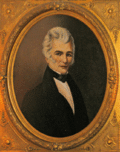 | William Carroll (1788–1844) [23] [24] | October 1, 1821 [25] – October 1, 1827 (term-limited) [d] | Democratic- Republican [15] | 1821 | |||
| 1823 | ||||||||
| 1825 | ||||||||
| 6 |  | Sam Houston (1793–1863) [26] | October 1, 1827 [27] – April 16, 1829 (resigned) [e] | Democratic [15] | 1827 | |||
| 7 |  | William Hall (1775–1856) [28] [29] | April 16, 1829 [30] – October 1, 1829 (did not run) | Democratic [15] | Succeeded from speaker of the Senate | |||
| 5 |  | William Carroll (1788–1844) [23] [24] | October 1, 1829 [31] – October 12, 1835 (term-limited) [d] | Democratic [f] | 1829 | |||
| 1831 | ||||||||
| 1833 | ||||||||
| 8 |  | Newton Cannon (1781–1841) [33] [34] | October 12, 1835 [35] – October 14, 1839 (lost election) | Whig [g] | 1835 | |||
| 1837 | ||||||||
| 9 |  | James K. Polk (1795–1849) [38] [39] | October 14, 1839 [40] – October 14, 1841 (lost election) | Democratic [15] | 1839 | |||
| 10 |  | James C. Jones (1809–1859) [41] [42] | October 14, 1841 [43] – October 15, 1845 (did not run) | Whig [15] | 1841 | |||
| 1843 | ||||||||
| 11 |  | Aaron V. Brown (1795–1859) [44] [45] | October 15, 1845 [46] – October 17, 1847 (lost election) | Democratic [15] | 1845 | |||
| 12 | 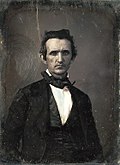 | Neill S. Brown (1810–1886) [47] [48] | October 17, 1847 [49] – October 16, 1849 (lost election) | Whig [15] | 1847 | |||
| 13 |  | William Trousdale (1790–1872) [50] [51] | October 16, 1849 [52] – October 16, 1851 (lost election) | Democratic [15] | 1849 | |||
| 14 |  | William B. Campbell (1807–1867) [53] [54] | October 16, 1851 [55] – October 17, 1853 (did not run) [53] | Whig [15] | 1851 | |||
| 15 |  | Andrew Johnson (1808–1875) [56] [57] | October 17, 1853 [58] – November 3, 1857 (did not run) [h] | Democratic [15] | 1853 | |||
| 1855 | ||||||||
| 16 | 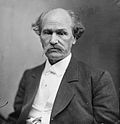 | Isham G. Harris (1818–1897) [59] [60] | November 3, 1857 [61] – March 12, 1862 (deposed) [i] | Democratic [15] | 1857 | |||
| 1859 | ||||||||
| 1861 | ||||||||
| 15 |  | Andrew Johnson (1808–1875) [56] [57] | March 12, 1862 [j] – March 4, 1865 (resigned) [k] | Military governor appointed by President | ||||
| — | 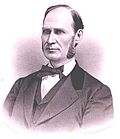 | Edward H. East (1830–1904) [65] | March 4, 1865 [15] – April 5, 1865 (successor took office) | — | Secretary of state acting | |||
| 17 |  | Parson Brownlow (1805–1877) [66] [67] | April 5, 1865 [68] – February 25, 1869 (resigned) [l] | Republican [15] | 1865 | |||
| 1867 | ||||||||
| 18 | 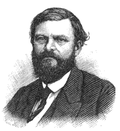 | Dewitt Clinton Senter (1830–1898) [69] [70] | February 25, 1869 [71] – October 10, 1871 (did not run) | Republican [15] | Succeeded from speaker of the Senate | |||
| 1869 | ||||||||
| 19 |  | John C. Brown (1827–1889) [72] [73] | October 10, 1871 [74] – January 18, 1875 (did not run) | Democratic [15] | 1870 | |||
| 1872 | ||||||||
| 20 | 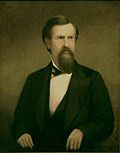 | James D. Porter (1828–1912) [75] [76] | January 18, 1875 [77] – February 16, 1879 (did not run) | Democratic [15] | 1874 | |||
| 1876 | ||||||||
| 21 |  | Albert S. Marks (1836–1891) [78] [79] | February 16, 1879 [80] – January 17, 1881 (did not run) [78] | Democratic [15] | 1878 | |||
| 22 |  | Alvin Hawkins (1821–1905) [81] [82] | January 17, 1881 [83] – January 15, 1883 (lost election) | Republican [15] | 1880 | |||
| 23 |  | William B. Bate (1826–1905) [84] [85] | January 15, 1883 [86] – January 17, 1887 (did not run) | Democratic [15] | 1882 | |||
| 1884 | ||||||||
| 24 |  | Robert Love Taylor (1850–1912) [87] [88] | January 17, 1887 [89] – January 19, 1891 (did not run) | Democratic [15] | 1886 | |||
| 1888 | ||||||||
| 25 |  | John P. Buchanan (1847–1930) [90] [91] | January 19, 1891 [92] – January 16, 1893 (lost election) | Democratic [15] | 1890 | |||
| 26 |  | Peter Turney (1827–1903) [93] [94] | January 16, 1893 [95] – January 21, 1897 (did not run) | Democratic [15] | 1892 | |||
| 1894 | ||||||||
| 24 |  | Robert Love Taylor (1850–1912) [87] [88] | January 21, 1897 [96] – January 16, 1899 (did not run) | Democratic [15] | 1896 | |||
| 27 |  | Benton McMillin (1845–1933) [97] [98] | January 16, 1899 [99] – January 20, 1903 (did not run) | Democratic [15] | 1898 | |||
| 1900 | ||||||||
| 28 |  | James B. Frazier (1856–1937) [100] [101] | January 20, 1903 [102] – March 27, 1905 (resigned) [m] | Democratic [15] | 1902 | |||
| 1904 | ||||||||
| 29 |  | John I. Cox (1855–1946) [103] [104] | March 27, 1905 [105] – January 17, 1907 (lost nomination) [103] | Democratic [15] | Succeeded from speaker of the Senate | |||
| 30 |  | Malcolm R. Patterson (1861–1935) [106] [107] | January 17, 1907 [108] – January 25, 1911 (withdrew) [n] | Democratic [15] | 1906 | |||
| 1908 | ||||||||
| 31 |  | Ben W. Hooper (1870–1957) [110] [111] | January 25, 1911 [112] – January 15, 1915 (lost election) | Republican [15] | 1910 | |||
| 1912 | ||||||||
| 32 |  | Thomas Clarke Rye (1863–1953) [113] [114] | January 15, 1915 [115] – January 15, 1919 (did not run) [113] | Democratic [15] | 1914 | |||
| 1916 | ||||||||
| 33 | 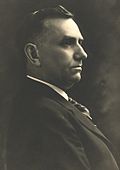 | Albert H. Roberts (1868–1946) [116] [117] | January 15, 1919 [118] – January 15, 1921 (lost election) | Democratic [15] | 1918 | |||
| 34 |  | Alfred A. Taylor (1848–1931) [119] [120] | January 15, 1921 [121] – January 16, 1923 (lost election) | Republican [15] | 1920 | |||
| 35 | 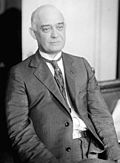 | Austin Peay (1876–1927) [122] [123] | January 16, 1923 [124] – October 2, 1927 (died in office) | Democratic [15] | 1922 | |||
| 1924 | ||||||||
| 1926 | ||||||||
| 36 |  | Henry Hollis Horton (1866–1934) [125] [126] | October 2, 1927 [127] – January 17, 1933 (did not run) [125] | Democratic [15] | Succeeded from speaker of the Senate | |||
| 1928 | ||||||||
| 1930 | ||||||||
| 37 |  | Hill McAlister (1875–1959) [128] [129] | January 17, 1933 [130] – January 15, 1937 (did not run) [128] | Democratic [15] | 1932 | |||
| 1934 | ||||||||
| 38 |  | Gordon Browning (1889–1976) [131] [132] | January 15, 1937 [133] – January 16, 1939 (lost nomination) [134] | Democratic [15] | 1936 | |||
| 39 |  | Prentice Cooper (1895–1969) [134] [135] | January 16, 1939 [136] – January 16, 1945 (term-limited) [o] | Democratic [15] | 1938 | |||
| 1940 | ||||||||
| 1942 | ||||||||
| 40 |  | Jim Nance McCord (1879–1968) [138] [139] | January 16, 1945 [140] – January 17, 1949 (lost nomination) [131] | Democratic [15] | 1944 | |||
| 1946 | ||||||||
| 38 |  | Gordon Browning (1889–1976) [131] [132] | January 17, 1949 [141] – January 15, 1953 (term-limited) [o] | Democratic [15] | 1948 | |||
| 1950 | Walter M. Haynes | |||||||
| 41 | 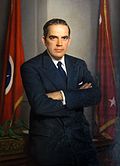 | Frank G. Clement (1920–1969) [142] [143] | January 15, 1953 [144] – January 19, 1959 (term-limited) [p] | Democratic [15] | 1952 | Jared Maddux | ||
| 1954 | ||||||||
| 42 |  | Buford Ellington (1907–1972) [146] [147] | January 19, 1959 [148] – January 15, 1963 (term-limited) [p] | Democratic [15] | 1958 | William D. Baird | ||
| 41 |  | Frank G. Clement (1920–1969) [142] [143] | January 15, 1963 [149] – January 16, 1967 (term-limited) [p] | Democratic [15] | 1962 | James L. Bomar Jr. | ||
| Jared Maddux | ||||||||
| 42 |  | Buford Ellington (1907–1972) [146] [147] | January 16, 1967 [150] – January 16, 1971 (term-limited) [p] | Democratic [15] | 1966 | Frank Gorrell | ||
| 43 |  | Winfield Dunn (1927–2024) [151] [152] | January 16, 1971 [153] – January 18, 1975 (term-limited) [p] | Republican [15] | 1970 | John Shelton Wilder [q] | ||
| 44 |  | Ray Blanton (1930–1996) [154] [155] | January 18, 1975 [156] – January 17, 1979 (did not run) | Democratic [15] | 1974 | |||
| 45 |  | Lamar Alexander (b. 1940) [157] | January 17, 1979 [158] – January 17, 1987 (term-limited) [r] | Republican [157] | 1978 | |||
| 1982 | ||||||||
| 46 |  | Ned McWherter (1930–2011) [160] | January 17, 1987 [161] – January 21, 1995 (term-limited) [r] | Democratic [160] | 1986 | |||
| 1990 | ||||||||
| 47 |  | Don Sundquist (1936–2023) [162] | January 21, 1995 [163] – January 18, 2003 (term-limited) [r] | Republican [162] | 1994 | |||
| 1998 | ||||||||
| 48 |  | Phil Bredesen (b. 1943) [164] | January 18, 2003 [165] – January 15, 2011 (term-limited) [r] | Democratic [164] | 2002 | |||
| 2006 | Ron Ramsey [s] | |||||||
| 49 |  | Bill Haslam (b. 1958) [166] | January 15, 2011 [167] – January 19, 2019 (term-limited) [r] | Republican [166] | 2010 | |||
| 2014 | ||||||||
| Randy McNally | ||||||||
| 50 |  | Bill Lee (b. 1959) [168] | January 19, 2019 [169] – Incumbent [t] | Republican [168] | 2018 | |||
| 2022 | ||||||||
